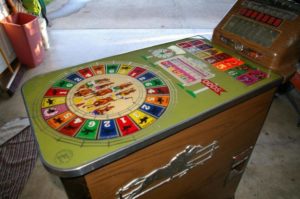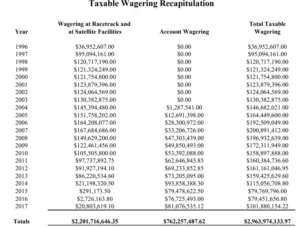The Sport of Kings apparently cannot survive today unless between races the peasants are pumping their copper into slots.
“The new law acknowledges what several other horse racing states already have concluded: that the new economic realities to sustain a viable horse racing industry require an alternative form of gaming to offset the high cost of live racing,” writes industry advocate Jeb Hannum in today’s Richmond Times-Dispatch.
The column hit print two days after a Virginia Racing Commission (VRC) public hearing on implementing the proposal approved by the 2018 General Assembly to allow up to 3,000 “historical horse racing” machines. No machine was on display during the meeting, and the commission apparently wants to see one before making some decisions.
“I want to see one of those machines sitting right down here. I want someone to explain exactly how that machine works. And why it’s not a slot machine,” said Commissioner I. Clinton Miller. “I want to be able to look people in the face and say ‘This is different. This is not Charles Town. This is not Las Vegas.’”
Looks like a slot machine to me.
All of this is rehash but Bacon’s Rebellion adds value. Pari-mutuel gambling has been legal in Virginia less than 25 years, making it slightly younger than the far larger and more ubiquitous state lottery. According to the VRC annual report, total wagering (the licensed kind) since 1996 is slightly under $3 billion, far less than the $37 billion taken in by the state lottery.
The placement of Colonial Downs in New Kent, instead of far more populous Northern Virginia or vacation destination Hampton Roads, ranks as the one of the dumbest economic development decision of the age. Revenue was anemic and declined rapidly after the recession of 2008.
Colonial Downs closed the track and eight off-track betting facilities in 2014, and only limited racing has taken place at other locations, detailed in the report. Virginia Equine Alliance, Hannum’s group, has since opened three satellite wagering facilities of its own with three more planned.
Those spread the revenue to localities. Before its collapse Colonial Downs was sharing revenue with nine localities, peaking at about $1.4 million in 2006 and 2007. Last year six localities received almost $400,000 in revenue, most of it for New Kent. The localities attending the hearing Tuesday clearly want plenty of local machines.
But technology is changing. Starting in 2004 “advance deposit wagering” by internet or telephone was allowed and almost $800 million in bets were placed that way through 2017, the largest source of revenue since the track closed. Four different websites are linked to the VEA website, with this as a fair example. With the Virginia Lottery happily taking bets via subscriptions online, that will be next for horse-race gambling.
Two more interesting links for background: the key roll calls in the House of Delegates and State Senate on House Bill 1609, which authorized the expansion into machine gambling. They too were placing a bet that Virginia’s voters are less antagonistic to gaming by machine than in the past.




